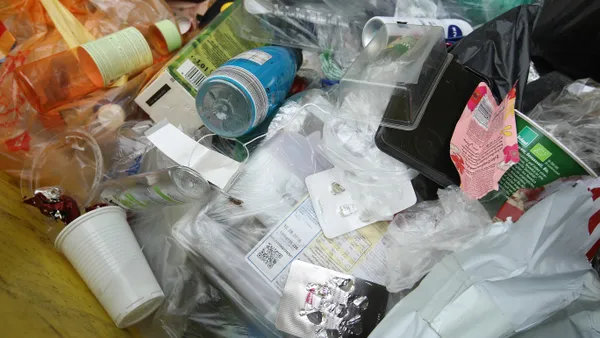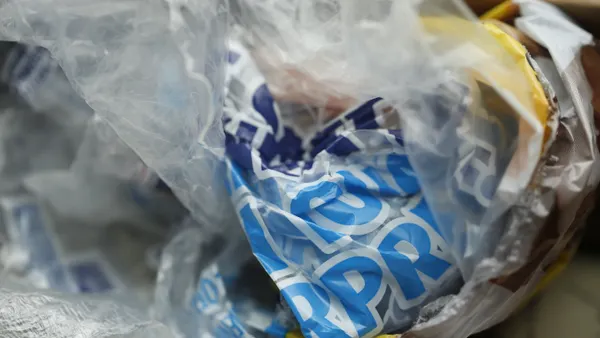Editor's Note: The following is a guest article written independently of Waste Dive's editorial outlook.
Scrap recycling has been an integral part of the U.S. economy, global trade and resource sustainability for more than 200 years. According to ISRI, more than 130 million metric tons of scrap metal, paper, plastic, glass, textiles, rubber and electronics were manufactured into specification-grade commodities in 2015 alone. In addition to being sold throughout the U.S., these commodities were sold to nearly 160 countries around the world.
At any given time, scrap recycling yards can encompass 15 to 60 acres of land, contain 20- to 30-foot piles of metal and have millions of dollars in inventory. For a rapidly changing industry valued at $106 billion, the need for 24/7 advanced security technology is becoming a higher priority for yard operators. With the price of scrap metal continuing to rise, it's common for yards to be the target of theft and vandalism, sometimes daily.
Early on, many scrap yards used trained guard dogs to combat break-ins. However, thieves quickly figured out where dogs were stationed — one accomplice would feed and deter them, so the other prowlers had free range of the yard. Fences were also erected around the perimeter of yards to obstruct intruders, but soon it became clear that fences were easy to jump. Another common layer of security that is to have guards patrol the perimeter, mostly during evening and overnight hours. However, that's a costly response to preventing theft and it’s been reported that some guards can be untrustworthy and even help thieves in some cases.
In other cases, scrap metal yard owners have taken matters into their own hands and personally guarded their facilities throughout the night. President and CEO Dennis Laviage, of C&D Scrap Metal Recyclers in Houston, Texas, was one of them.
"The guards were not doing anything more than what I could do," stated Laviage. "I was tired of the theft and paying for additional personnel, who sometimes didn't even realize people were on the property. Instead, I took matters into my own hands and patrolled the yard sometimes from 12 a.m. to 3 a.m. to make sure there weren't any intruders."
Unlike merchandise in a jewelry store, each piece of scrap metal doesn't have its own serial number or specific identifier. This makes it more difficult to know what was taken or where to track the item. With the evolution of camera technology, scrap metal yard owners can feel more secure about protecting their inventory both during and after operating hours.
Earlier cameras could record events that happened, but alerts to an intrusion or theft were not instantaneous until the next day when footage was screened and reviewed for activity. Now, Laviage and other owners have real-time video solutions that can be viewed from mobile apps on their smartphone or computer. Not only are these cameras and analytics important for keeping intruders out and assets safe, but they can also be used to ensure employee integrity, verify any workers' compensation claims or review customer complaints.
While high-resolution cameras that have live video streams are security enhancements, new thermal verification analytics and service assurance technology has advanced security solutions like never before. Service assurance solutions are now able to continuously detect and diagnose problems and recommend solutions. These types of analytics help solve the problems with network downtime and missing video evidence, while also addressing cyber hygiene and audit compliance needs.
The benefit for yard owners is what often was a labor-intensive and time-consuming process can now be resolved in a matter of seconds. When a failure or vulnerability is detected, the solution automatically sends an alert with the component, location, problem, event, time, severity and solution to specific administrators. Organizations can now have instant visibility for both problems and solutions across their security network, allowing issues to be fixed immediately rather than days or weeks after an event occurs.
For scrap metal yards, service assurance technologies precisely document what components and processes are running on the network and how each is performing. In the case of C&D Scrap Metal, which deploys 20 video cameras to monitor 7.5 acres, they are alerted instantly if there is an internet outage or other issue. It's immediate troubleshooting of the security network, instead of having to wait to view video or realizing the camera didn't record and footage is unavailable.
Drew Alexander is director of product management for STANLEY Security, a provider of commercial security and division of Stanley Black & Decker. Alexander’s professional experience in thermal video, analytics and data integration applies to a wide range of industries throughout the security market, including equipment dealers and manufacturers who serve recycling, infrastructure, farming, construction rental and utilities.









